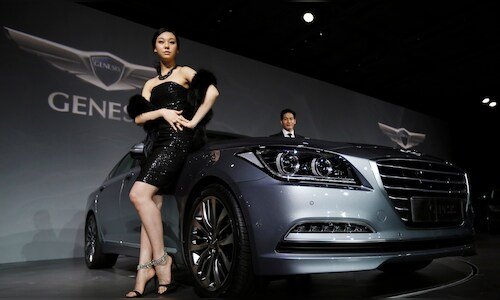“We are also strategically evaluating the introduction of Genesis, Hyundai’s global luxury marque, to redefine luxury through innovation, design and differentiated experiences,” said Tarun Garg, Whole-time Director and Chief Operating Officer at HMIL. “This aligns with our aspiration to serve the evolving expectations of discerning Indian consumers.”
Genesis, launched in 2015, is Hyundai Motor Company’s standalone premium brand. Its global portfolio includes sedans, SUVs, and EVs such as the G70, G80, GV60, GV70, and GV80.
Bringing Genesis to India would mark Hyundai’s entry into the growing but still niche luxury car segment, currently led by Mercedes-Benz, BMW, and Audi, with JLR and Volvo also expanding their presence. The brand’s entry remains under review, with market maturity, consumer readiness, and distribution strategy under consideration.
The Genesis evaluation comes as Hyundai prepares for what it calls the “next chapter” in its India journey. This phase involves a multi-year product roadmap, expanded manufacturing capacity, and entry into new segments.
“As we move forward, we remain committed to investing meaningfully in India’s mobility future, driving innovation, accessibility, and sustainable growth,” said Garg in the report. “Together with India – Towards New Horizon, we are entering an exciting phase of growth.”
Hyundai plans to launch 26 new models in India by FY30. The lineup will include 20 internal combustion engine (ICE) vehicles and six battery electric vehicles (BEVs), with more details to be announced at Hyundai’s Investor Day in October 2025. The upcoming Talegaon plant, set to begin operations in FY26, will support this rollout and boost production capacity across both ICE and EV segments.
Hyundai’s recent activity included 20 product interventions in FY25. These included model upgrades such as the Exter (dual-cylinder CNG), Venue (sunroof in lower trims), Aura (entry-level eCNG variant), and Alcazar (facelift). The launch of the Creta Electric marked Hyundai’s first mass-market EV offering in India.
The company recorded a 33% year-on-year increase in CNG vehicle sales in rural markets, contributing to a rise in rural penetration from 19.4% to 20.9%. This growth highlights Hyundai’s focus on affordability and lower operating costs outside urban centres.
In the EV space, Hyundai claims that it is building a localised ecosystem and has started battery pack assembly at its Chennai facility. The company is also in discussions for cell localisation through strategic partnerships.
The company has installed 80 fast chargers and aims to expand this to over 600 units in the next 6–7 years. These efforts are supported by home charging solutions and the myHyundai CMS digital interface.
Hyundai maintained its No. 2 position in both domestic and export markets in FY25, contributing 18.5% to Hyundai Motor Company’s global output. SUVs made up 69% of its domestic sales. However, the competitive landscape is tightening, with Mahindra & Mahindra emerging as a strong contender for the No. 2 spot in the current fiscal year.
“We believe India will play a significant role in shaping Hyundai’s roadmap—not just as a volume contributor, but as a lead market for future-ready mobility solutions,” Garg added.
